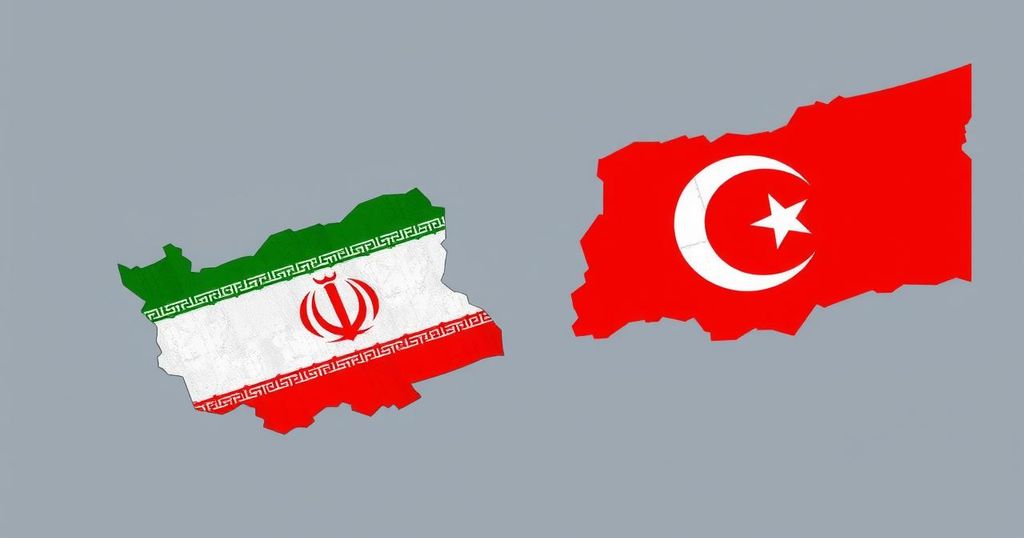Iran-Turkey Relations Strengthen in Wake of Yahya Sinwar’s Death

The article discusses the recent diplomatic activities of Iranian Foreign Minister Abbas Araghchi following the death of Hamas leader Yahya Sinwar, highlighting the strengthening ties between Iran and Turkey. It details their shared support for Hamas and Hezbollah, as well as their discussions on regional conflicts involving Azerbaijan and Armenia, all set against the backdrop of rising tensions with Israel.
Following the passing of Yahya Sinwar, the prominent leader of Hamas, Iranian Foreign Minister Abbas Araghchi undertook a diplomatic trip to Turkey, which was part of a broader regional itinerary that included visits to several Middle Eastern nations, including Lebanon, Syria, Saudi Arabia, Qatar, Iraq, Oman, Jordan, and Egypt. This tour underscores Iran’s strategic intent to consolidate its influence throughout the region while simultaneously seeking to marginalize Israel’s position. In light of Sinwar’s demise, it appears that Iran and Turkey are poised to intensify their support for both Hamas and Hezbollah. Both Tehran and Ankara have aligned interests in supporting Hamas against Israel, with Iran extending its backing to Hezbollah in Lebanon as well. During a recent regional conference held in the South Caucasus, Foreign Minister Araghchi remarked on the urgency of addressing the escalating conflict in Gaza and Lebanon, alluding to the collective perception of the potential for wider hostilities. Araghchi stated, “Iranian Foreign Minister Abbas Araghchi has warned against the expansion of war in the region, saying there is a common understanding about the threat of conflicts in Gaza and Lebanon and the critical situation of the displaced.” His visit to Istanbul coincided with this regional conference and was instrumental in fostering discussions about Israeli actions deemed aggressive by both nations. It is noteworthy that over the last decade, Iran and Turkey have cultivated increasingly closer ties, despite occasional differences in their geopolitical strategies. A significant point of convergence is their mutual association with Qatar, which serves as a host for Hamas operations. This trilateral relationship is significant in the ongoing conflict dynamics within the region. Moreover, discussions have extended to involvement in conflicts between Azerbaijan and Armenia, with Turkey traditionally supporting Azerbaijan while Iran maintains beneficial relations with Armenia. Meanwhile, Russia adopts a multifaceted approach, fostering relationships with both Iran and Turkey while tacitly endorsing Azerbaijan’s advances against Armenia. In recent years, Turkey’s hostile stance toward Israel has intensified, with Foreign Minister Hakan Fidan and President Recep Tayyip Erdogan expressing particularly severe criticisms of Israeli policies and actions. Consequently, the intersection of these developments reinforces a growing alliance between Iran and Turkey, aimed at countering Israeli actions and bolstering their shared interests in regional power dynamics.
This analysis explores the recent diplomatic maneuvers undertaken by Iran and Turkey in the context of heightened regional tensions following the death of Hamas leader Yahya Sinwar. The backdrop includes an ongoing conflict between Israel and Palestinian factions, particularly Hamas and Hezbollah, with Iran playing a pivotal role as a supporter of these groups. Additionally, the complexities of the relationships between Iran, Turkey, Qatar, Azerbaijan, and Armenia illustrate the intricate geopolitical landscape of the Middle East and surrounding areas. By situating the maneuverings of Iran and Turkey within this broader framework, the article highlights both countries’ responses to perceived threats and their efforts to assert influence in a turbulent region.
In conclusion, the aftermath of Yahya Sinwar’s death has catalyzed a significant pivot in Iranian-Turkish relations, reinforcing their commitment to supporting Hamas and Hezbollah against Israel. The collaborative efforts between Tehran and Ankara underscore a shared perception of the prevailing threats within the region. Furthermore, their discussions regarding the conflicts involving Azerbaijan and Armenia reflect the intricate geopolitical dynamics that influence their foreign policies. As Turkey continues to adopt a progressively hostile approach toward Israel, the partnership between Iran and Turkey is likely to evolve further in the context of their mutual interests and challenges.
Original Source: www.jpost.com








